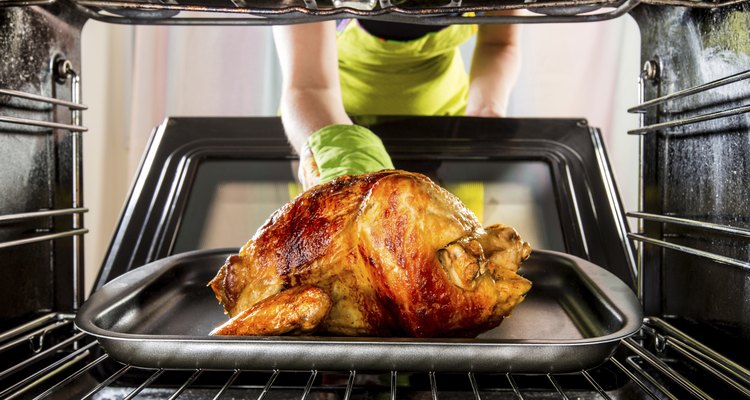
cookelma/iStock/Getty Images
If you're like most people, your kitchen is stocked with equipment designed to cook food in a variety of ways. Every chicken breast can cause a conundrum: using a dry heat method like roasting, sauteing and grilling has some benefits, while using a wet cooking method, like boiling, poaching and steaming, has others. Dry cooking methods are right for some recipes but not for others, so choose your method on a case-by-case basis.
Dry Cooking Gives Food Crunch
Dry cooking gives your food a texture and crunch that it will never get from wet cooking methods. Using a dry heat method, like roasting or grilling, is best when you want to create a crust on a piece of fish or chicken. Grilling in particular, when done on an open grill instead of in foil, gives the finished product char marks that not only create a satisfying crunch but fill the dish with smoky flavor. Dry heat also keeps some naturally rubbery foods, like portobello mushrooms, from getting even mushier.
Dry Cooking Gives You Flexibility and Control
You can't toast bread croutons or bake a cake with wet cooking methods. Furthermore, in some cases, using dry air gives you more control over the additional flavors you add to a dish. A dry rub or cloves of garlic will season a piece of chicken when they're baked or grilled onto the meat, but flavorings will run off of chicken as it's being steamed or poached. Some exceptions do exist; cooking proteins in stock or soup will certainly impart a good deal of flavor. You'll also find that cooking methods that use dry air also tend to give you more space to work with; you can't fit the Thanksgiving turkey into a saucepan of boiling water.
Dry Cooking Requires Fat
As you've likely heard your whole life, oil and water don't mix. When it comes to cooking methods, this fact can mean a difference of hundreds of fat calories. You won't need to add olive oil to a pot of poaching liquid to keep chicken pieces from sticking, but you do need to use some sort of fat to prepare a baking dish or saucepan before cooking most types of foods with dry heat. Even in grilling, you'll generally need to brush a piece of meat or fish with olive oil before cooking or it will be difficult to pry off the grill.
Dry Cooking Dries Food Out
Paying close attention to your food can prevent it from drying out, but as soon as the phone rings or you turn your attention to another element of the meal, you run the risk of leaving your dish in the heat too long and drying it out. Using liquid, as you'd expect, will make for a juicier finished product. Don't use dry heat to cook meats that tend to be tough, like lamb breasts or beef brisket. Braising these meats -- brown them first in a saucepan, then pour in some water or stock and cook the covered dish in the oven -- will make them tender in a way that dry cooking never will.
Cooking to Preserve Nutrients
When it comes to preserving nutrients in cooked food, neither dry nor wet cooking methods have the distinct advantage. Generally speaking, the longer a fruit or vegetable is cooked -- whether in water or by dry heat -- the more nutrients leach out of it. If retaining nutrients if your objective, try boiling your fruits and vegetables just until they're tender, then use the cooking liquid in another part of the dish so you can retain as many vitamins as possible. Steaming is also a smart option when you're concerned about nutrients, and if you must use dry heat, use your oven's broiler for the shortest cooking time.
Related Articles

Does Simmering Ground Beef Make It More ...

The Uses of Sodium Bicarbonate in ...
Homemade Onion Soup Mix Recipe

How to Use a Probe Cooking Thermometer

How to Dry Baseball Caps

Tips for Cooking Chicken Breast in a ...

How to Make Pot Roast in a Cooking Bag
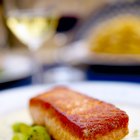
How to Get Salmon Crispy on the Outside ...
How to Cook in a Gas Stove or Oven
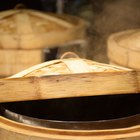
How to Cook Fish in a Bamboo Steamer
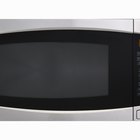
How to Convert Stovetop Recipes to ...

How to Reduce Wrinkles With Hang Drying
Does Cooking Break Down Fiber?
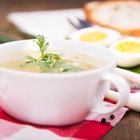
How to Cook Vegetables With Progresso ...

How to Cook Steel-Cut Oats in a Slow ...
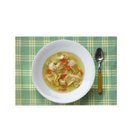
What Are Chicken Granules?
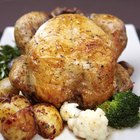
How to Smoke a Chicken in the Oven

How to Care for Wet Leather

Easy Way to Cook Chicken Breasts for ...
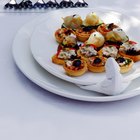
How to Calculate Portions
References
Writer Bio
Cooking, travel and parenting are three of Kathryn Walsh's passions. She makes chicken nuggets during days nannying, whips up vegetarian feasts at night and road trips on weekends. Her work has appeared to The Syracuse Post-Standard and insider magazine. Walsh received a master's degree in journalism from Syracuse University.
Photo Credits
cookelma/iStock/Getty Images